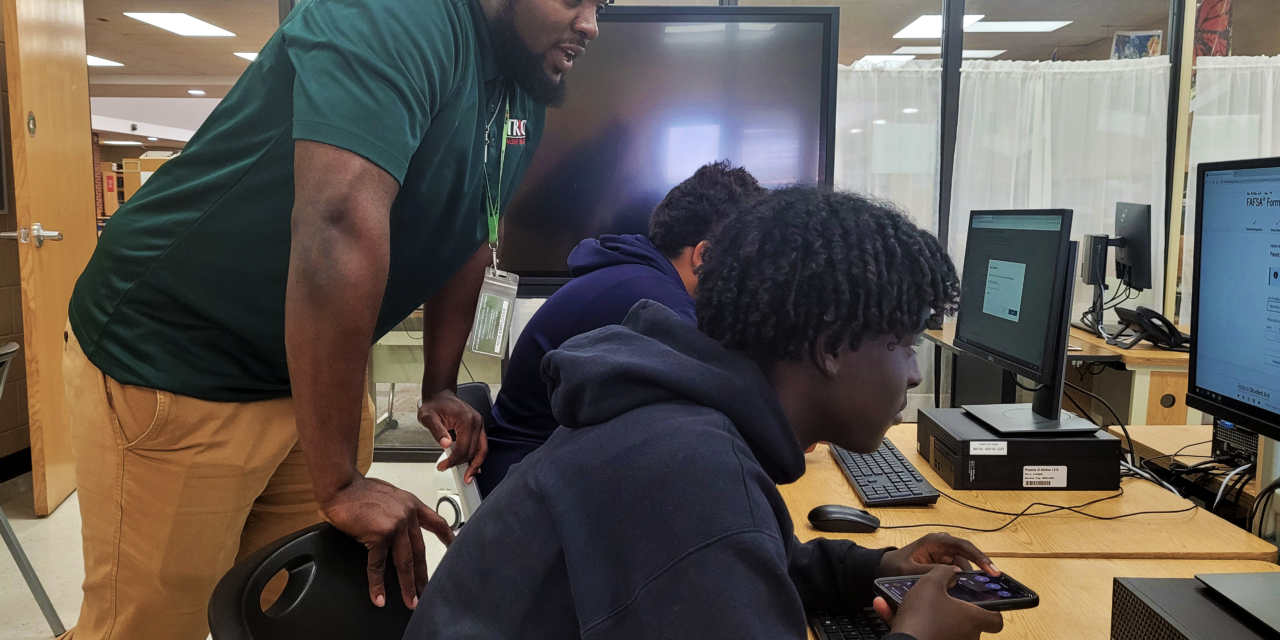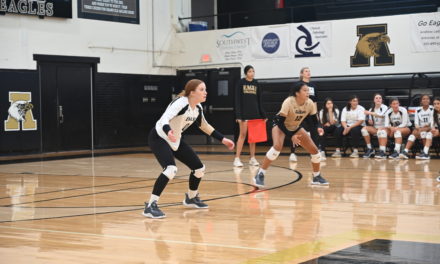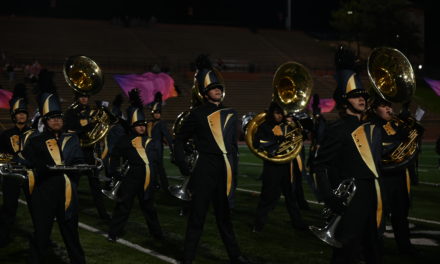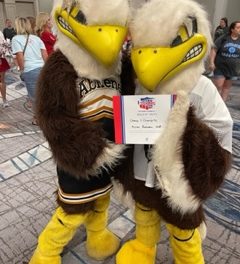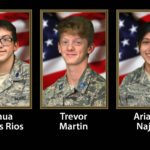By Glorianna Nichols.
As senior Braxton Scott slowly walks down the stairs to the library, he starts to feel on edge.
But once he looks down at his neon green pass, he thinks about how just being there was already a huge step to take because his family didn’t go to college but he knows that he’ll be in a college classroom next fall.
This neon green pass was from TRIO, a government funded grant opportunity to help students from disadvantaged backgrounds and first-generation students, or students who are the first to graduate in their family. The TRIO programs were set up in 1964 during Lyndon B. Johnson’s presidency with the purpose of battling poverty and to increase the number of people who complete high school and their post-secondary education from disadvantaged backgrounds.
“But more than the legalization, we are a program set up through the Department of Education to help,” Gayla Herrington, the director of TRIO Talent Search, said. “We help students with their college attendance needs.”
There are four TRIO programs home to Abilene: The Ronald E. McNair Program, Student Support Systems, Upward Bound and Talent Search. They were all grants given to Abilene Christian University, but the programs encourage students to join any college they want to attend.
In the Ronald E. McNair Program, students present a research-based project at a national conference and, for students in Texas, the conference is expected to take place at the University of North Texas in 2023. Students receive guidance from a professor for their project and get the help needed to apply to graduate school.
In Student Support Services, funds are awarded to institutions of higher education to provide opportunities for academic development, assist students with basic college requirements and to motivate students toward the successful completion of their college education through a grant competition.
AISD gave “a letter of support” to ACU allowing TRIO staff to work with students in the district. While Talent Search and Upward Bound are the only programs available at Abilene High, they both provide unique benefits.
In Upward Bound, students receive tutoring and can participate in an eight-week summer program to enhance their learning skills and “combat the summer melt,” or prevent the loss of motivation to attend college after high school graduation. Upward Bound also differs from Talent Search in what qualifies students to join. High school students from low-income families and from families where neither parent holds a bachelor’s degree can join this program to receive fundamental support. Students must also have an academic need, such as struggling in one or more subjects at school.
Talent Search assists middle school and high school students who have the potential to succeed in higher education. TRIO advisors visit these students during the school day to help them navigate the complexities of preparing for college, such as admissions requirements, completing applications, scholarships and various student financial aid.
“Basically, we help students that are making good grades and want to go to college,” Herrington said. “Of course, if a student really wants to be in Talent Search but their parent has a degree, we will help them if we can.”
Students a part of TRIO are given opportunities to participate in out-of-school activities, such as college tours and summer camps.
“Our students can also have fee waivers for SAT and ACT tests so that they never have to pay for these tests,” Herrington said. “We will have ways to help our students succeed on these tests, too. They get a college advisor assigned to them to help them learn about and progress toward college.”
Students can ask their counselor for either application. The Upward Bound application has an orange cover sheet while the Talent Search application has a green cover sheet. Once students turn in the application to their counselor, it goes through a review process to see if they meet the requirements for the program.
Talent Search serves grades sixth through twelfth and Upward Bound serves ninth through twelfth grade. The Talent Search team visits middle schools to explain the program and provides applications to students. Herrington believes that joining Talent Search in sixth grade is ideal, which is exactly what senior Braxton Scott did.
“I joined because I know that I want to go to college and I wanted to get helpful tips to get there,” Scott said. “TRIO has helped me understand what I need to get better at and what skills I need, like to stay more organized and to use my time wisely, as well as how to get help from teachers.”
Scott plans to attend ACU next fall where he’ll major in sports recreational management and minor in coaching to eventually pursue a career in coaching for football. His interest in the sport helped him decide his main area of study, but the decision for what exact college he wanted to attend proved to be more difficult.
“TRIO definitely helped me make my final decision,” Scott said. “Going on all the college tours and seeing different schools helped me decide which ones best fit my needs.”
Herrington reiterates that choosing a college that suits one’s needs is essential. Before becoming the Talent Search director, she was a certified school teacher and a TRIO advisor. Herrington started working for TRIO because she “loves what it does for students” and relates to not having the resources to be successful in college.
“TRIO is close to my heart,” Herrington said. “I didn’t have anyone to help me figure out what I needed to do to go to college and I was a first-generation, low-income student and didn’t know where to turn to get help when needed. I ended up homeless the first few weeks of college because I didn’t know that I had to fill out the dorm registration form nor did I have the money for it. It is things like this that I want my students to avoid, and that is why I want to help.”
Like Herrington, students often want to go to college but don’t know what needs to be done before their enrollment. Herrington suggests that students should ask “a lot of questions to anyone and everyone” to prevent confusion.
“Come see one of our advisors and we will get them started,” Herrington said. “Sometimes, we don’t know enough to know what questions to ask, but just ask and they will direct you to where you need to go to get help. Mr. Hunter is in the library every other week, meeting with our students.”
Students may recognize Talent Search advisor Joshua Hunter dashing through the halls with the neon green for students in the program to come meet with him in the library. Hunter visits high schools and middle schools to conduct various workshops with students in the program.
“These workshops highlight different aspects that are important to learn in your pursuit towards college or post high school education,” Hunter said. “Then for senior year, it is less about educating and more about walking through the college pursuit process. This is where I help students fill out the FAFSA, apply for colleges, sign up for SAT and ACT tests, remind you to get your meningitis shot and other things seniors need to do in order to attend college.”
Hunter believes that one of the benefits of joining TRIO is that it provides “a sense of community” because students are surrounded by others in the same position as them.
“Students will understand each other’s fears, worries and even excitement about potentially going to college,” Hunter said. “Another benefit is gaining knowledge of the potential paths you may want to take when it comes to education and having someone help you keep track of the objectives you need to complete in order to go to college. Also, having someone help you figure out what you want to do when you leave high school and enter college helps you have an idea and a plan of what you want to do when you get to college so that you’re not wasting time and money.
Hunter initially started working for TRIO because it was “an educational and financial providing opportunity,” but being an advisor eventually became more than just a job for him.
“For my first year of doing this job, it was my practicum for my degree,” Hunter said. “But, I chose this because I have a passion for helping students in this time frame of their life. I want to help them think about and make decisions on their future. I want students to be proactive about what they want from their life instead of relying on their circumstances to dictate what they are going to do. This stage of your life is very critical, because the decisions you make in this time period will have a major impact on the trajectory of your life moving forward. So, if I can assist you in making good decisions, then I want to be a part of that.”
Hunter inherited his selflessness from his parents because, far as he can remember, Hunter’s parents were always helping others.
“I didn’t know much about college and what was offered to study coming out of high school, but I did know that I wanted to help people,” Hunter said. “That’s all I knew. So, when I was in my senior year of high school, I was talking with my parents about what I wanted to study and I originally chose psychology. I began to describe to my father about how I wanted to help people and he told me that I should study social work. I had no idea what that was at the time. I did some research and it matched my views at the time of how I wanted to help people. Social work gives you the frameworks and resources to tangibly help someone through a situation and that was very attractive to me.”
While working for TRIO, Hunter received his Bachelor’s of Science in social work and is working towards his master’s degree in social work.
“To have a master’s can afford me the opportunity to explore ways in which I can help others,” Hunter said. “It can grant me access to different and potentially greater pathways to carry out my desire to help others through their situations with the best of my efforts. I will also add, because it is important, that it can also be monetarily beneficial for me as well.”
For Hunter, working as a TRIO advisor has “been a struggle” while pursuing his degree.
“I’m not going to lie and say that it’s easy,” Hunter said. “One of the reasons I wanted to get my master’s completed before I started working was because I know myself well enough to know that when I got out of the classroom, it was going to be hard for me to complete my school work. I don’t feel like I am in school and on top of that I have work demands that I need to fulfill. In many instances, my school work takes a backseat to my job and other areas of my life.”
With this, Hunter advises that everyone should “know their limits” when trying to work while attending school to alleviate stress. However, he doesn’t want students to fear pushing their educational limits.
“I would always start by getting to know your interests and desires,” Hunter said. “Some aspect of the thing you like doing or being knowledgeable about could lead to what you will study for post high school education. Pay attention to the things you have problems with, because you could end up having a career that addresses the problem. Many companies, organizations and industries are created by someone wanting to fix a problem they are passionate about.”
Overall, Hunter wants students to know that he wants to help them to the best of his abilities.
“If I don’t know, I will try to find you a resource that does,” Hunter said. “I just want to help you in your process to set up your future.”
According to Scott, Hunter is successful in demonstrating his goal of wanting to help students.
“I like that we have someone we can talk to about anything,” Scott said. “He’s also been in the same place as me because he went to school in Abilene and played football. He’s always willing to help somebody out.”
As stated by Herrington, TRIO is “a family of believers in the college dreams.” She encourages students to pursue their educational dreams no matter what.
“Don’t let fear, money, choices, or grades keep you from attending post-secondary education,” Herrington said. “You can overcome your fear by asking for help from those that have gone to college before you. If money is holding you back— don’t let it. There are affordable options for colleges in our area. If there are too many choices and it seems overwhelming, then step back and get help from any TRIO staff, the COOL Counselor or your high school counselor. If you don’t think your grades are good enough to get in, then start small and go to a junior college and get those grades up so that you can transfer to a four-year college. If you really want to go to college, you can. If I can do it, so can you. You can do this.”

